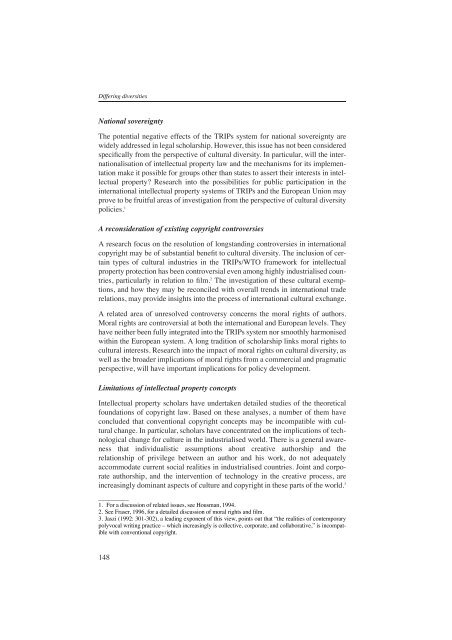<strong>Differing</strong> <strong>diversities</strong>National sovereigntyThe potential negative effects <strong>of</strong> the TRIPs system for national sovereignty arewidely addressed in legal scholarship. However, this issue has not been consideredspecifically from the perspective <strong>of</strong> cultural diversity. In particular, will the internationalisation<strong>of</strong> intellectual property law and the mechanisms for its implementationmake it possible for groups other than states to assert their interests in intellectualproperty? Research into the possibilities for public participation in theinternational intellectual property systems <strong>of</strong> TRIPs and the <strong>Europe</strong>an Union mayprove to be fruitful areas <strong>of</strong> investigation from the perspective <strong>of</strong> cultural diversitypolicies. 1A reconsideration <strong>of</strong> existing copyright controversiesA research focus on the resolution <strong>of</strong> longstanding controversies in internationalcopyright may be <strong>of</strong> substantial benefit to cultural diversity. The inclusion <strong>of</strong> certaintypes <strong>of</strong> cultural industries in the TRIPs/WTO framework for intellectualproperty protection has been controversial even among highly industrialised countries,particularly in relation to film. 2 The investigation <strong>of</strong> these cultural exemptions,and how they may be reconciled with overall trends in international traderelations, may provide insights into the process <strong>of</strong> international cultural exchange.A related area <strong>of</strong> unresolved controversy concerns the moral rights <strong>of</strong> authors.Moral rights are controversial at both the international and <strong>Europe</strong>an levels. Theyhave neither been fully integrated into the TRIPs system nor smoothly harmonisedwithin the <strong>Europe</strong>an system. A long tradition <strong>of</strong> scholarship links moral rights tocultural interests. Research into the impact <strong>of</strong> moral rights on cultural diversity, aswell as the broader implications <strong>of</strong> moral rights from a commercial and pragmaticperspective, will have important implications for policy development.Limitations <strong>of</strong> intellectual property conceptsIntellectual property scholars have undertaken detailed studies <strong>of</strong> the theoreticalfoundations <strong>of</strong> copyright law. Based on these analyses, a number <strong>of</strong> them haveconcluded that conventional copyright concepts may be incompatible with culturalchange. In particular, scholars have concentrated on the implications <strong>of</strong> technologicalchange for culture in the industrialised world. There is a general awarenessthat individualistic assumptions about creative authorship and therelationship <strong>of</strong> privilege between an author and his work, do not adequatelyaccommodate current social realities in industrialised countries. Joint and corporateauthorship, and the intervention <strong>of</strong> technology in the creative process, areincreasingly dominant aspects <strong>of</strong> culture and copyright in these parts <strong>of</strong> the world. 3__________1. For a discussion <strong>of</strong> related issues, see Housman, 1994.2. See Fraser, 1996, for a detailed discussion <strong>of</strong> moral rights and film.3. Jaszi (1992: 301-302), a leading exponent <strong>of</strong> this view, points out that “the realities <strong>of</strong> contemporarypolyvocal writing practice – which increasingly is collective, corporate, and collaborative,” is incompatiblewith conventional copyright.148
Reasearch position paper 5However, the range and rigour <strong>of</strong> research on cultural developments in industrialisedcountries is not matched by a corresponding depth <strong>of</strong> research on culturaldiversity issues. While developing countries and aboriginal peoples have receivedsome scholarly attention, “transitional” states, immigrant minorities, andRoma/Gypsy peoples are not well-represented in the literature. Moreover,research concerning the similarities between these groups remains quite rudimentary,in spite <strong>of</strong> the historical, cultural, and political resemblances which are immediatelyapparent among them.Research into copyright concepts also tends to be diagnostic in nature. In contrast,few scholars attempt to address the pragmatic and precise issue <strong>of</strong> how copyrightconcepts may help or hinder cultural diversity policies. Sustained scholarly investigation<strong>of</strong> the practical effects <strong>of</strong> copyright theory on cultural diversity appear tobe largely neglected. Systematic analyses <strong>of</strong> how copyright concepts can bemoulded to serve non-traditional cultural contexts – if at all – will be <strong>of</strong> great valueto the development <strong>of</strong> cultural policy. In particular, the problem <strong>of</strong> whether copyrightconcepts can be used to promote objectives <strong>of</strong> cultural diversity policies callsfor closer examination.Distinguishing between technologies <strong>of</strong> creation and disseminationIn the same vein, the possibilities <strong>of</strong> technology for promoting cultural objectiveshave not been extensively explored by intellectual property scholars. Here, too,research concentrates on the innovative possibilities <strong>of</strong> technology for creativeactivities, without considering the potential contribution <strong>of</strong> communications andmedia technologies to cultural diversity. Future research should focus on the waysin which intellectual property law can shape the use <strong>of</strong> technology for culturaldiversity purposes.Breakdown <strong>of</strong> traditional distinctions within intellectual property lawThe unprecedented progress <strong>of</strong> technology has also created a need to re-evaluatethe validity <strong>of</strong> accepted legal structures in the new cultural environment. Theextension <strong>of</strong> established principles <strong>of</strong> intellectual property law to new technologiesappears to be bringing traditional distinctions within intellectual property lawinto question. No doubt, this lack <strong>of</strong> clarity in the law reflects the pr<strong>of</strong>ound socialeffects <strong>of</strong> technological developments, which <strong>of</strong>ten render such traditionaldichotomies in western culture as those <strong>of</strong> art and science, artist and audience, andprivate rights and public interest somewhat ambiguous. 1For example, current scholarship on intellectual property has found that attemptsto create a framework for the legal regulation <strong>of</strong> programs for computer s<strong>of</strong>twarehave caused a blurring <strong>of</strong> the boundary dividing copyright from patents. 2__________1. Christie (1995: 525) points out that, “there is a trend towards subject-matters in which the user playsa role in determining the ultimate nature <strong>of</strong> the work.” The participatory possibilities <strong>of</strong> technology for theart <strong>of</strong> classical music were also envisioned by Canadian pianist, Glenn Gould, who labelled the technologically-implicatedand empowered listener the “New Listener” (see G. Payzant, Glenn Gould: Musicand Mind, Van Nostrand Reinhold, Toronto, 1978, pp. 29-32, 42, 70).2. For example, see Franzosi and De Sanctis, 1995.149
- Page 5 and 6:
PrefaceThe present text constitutes
- Page 7:
Part IDiffering diversities:transve
- Page 11 and 12:
The study: background, contextand m
- Page 13 and 14:
Transversal study on the theme of c
- Page 15:
Transversal study on the theme of c
- Page 18:
Differing diversitiesi. new forms o
- Page 23 and 24:
IntroductionTransversal perspective
- Page 25 and 26:
Transversal study on the theme of c
- Page 27 and 28:
The challenge of diversityCulture,
- Page 29 and 30:
Transversal study on the theme of c
- Page 31 and 32:
Transversal study on the theme of c
- Page 33 and 34:
Diversity, citizenship, and cultura
- Page 35 and 36:
Transversal study on the theme of c
- Page 37:
Transversal study on the theme of c
- Page 40 and 41:
Differing diversitieslanguages. The
- Page 42 and 43:
Differing diversitiesprogrammes int
- Page 45 and 46:
Culture, government and diversity:p
- Page 47 and 48:
Transversal study on the theme of c
- Page 49 and 50:
Transversal study on the theme of c
- Page 51 and 52:
Transversal study on the theme of c
- Page 53:
Transversal study on the theme of c
- Page 56 and 57:
Differing diversitiesin the pursuit
- Page 58 and 59:
Differing diversitiesthe need for m
- Page 60 and 61:
Differing diversitiescircumstances
- Page 62 and 63:
Differing diversitiesclasses artist
- Page 64 and 65:
Differing diversitiesMy point, then
- Page 66 and 67:
Differing diversitiesiii. that the
- Page 69:
Transversal study on the theme of c
- Page 73 and 74:
The consequences of European media
- Page 75 and 76:
Reasearch position paper 1and contr
- Page 77 and 78:
Reasearch position paper 1directly
- Page 79 and 80:
Reasearch position paper 1There hav
- Page 81 and 82:
Reasearch position paper 1presence
- Page 83 and 84:
Reasearch position paper 1Strategic
- Page 85 and 86:
Reasearch position paper 1New media
- Page 87 and 88:
Reasearch position paper 1Blumler,
- Page 89 and 90:
Reasearch position paper 1Hoffmann-
- Page 91 and 92:
Reasearch position paper 1Pauwels,
- Page 93 and 94:
Assessing the implementationof cult
- Page 95 and 96:
Reasearch position paper 2tics abou
- Page 97 and 98: Reasearch position paper 2Act (GPRA
- Page 99 and 100: Reasearch position paper 2factually
- Page 101 and 102: Reasearch position paper 2The evalu
- Page 103 and 104: Reasearch position paper 2capacity
- Page 105 and 106: Reasearch position paper 2Luchtenbe
- Page 107 and 108: The cultural policies of the Europe
- Page 109 and 110: Reasearch position paper 3went, wou
- Page 111 and 112: Reasearch position paper 3The histo
- Page 113 and 114: Reasearch position paper 3integrati
- Page 115 and 116: Reasearch position paper 3of differ
- Page 117 and 118: Reasearch position paper 3European
- Page 119 and 120: Reasearch position paper 3voice to
- Page 121: Reasearch position paper 3Howe, Mar
- Page 124 and 125: Differing diversitiesContemporary d
- Page 126 and 127: Differing diversitiesWhereas in the
- Page 128 and 129: Differing diversitiesbuilding on th
- Page 130 and 131: Differing diversitieswhen tackling
- Page 132 and 133: Differing diversitiesand that is pr
- Page 134 and 135: Differing diversitiesSennett, Richa
- Page 136 and 137: Differing diversitiesallowing their
- Page 138 and 139: Differing diversitiesNevertheless,
- Page 140 and 141: Differing diversitiesgrowth also ex
- Page 142 and 143: Differing diversitiesAt a deeper le
- Page 144 and 145: Differing diversitiesconventional c
- Page 146 and 147: Differing diversitiesworks, and the
- Page 150 and 151: Differing diversitiesSimilarly, at
- Page 152 and 153: Differing diversitiesCoombe, Rosema
- Page 154 and 155: Differing diversitiesWoodmansee, Ma
- Page 156 and 157: Differing diversitiesIndeed, which
- Page 158 and 159: Differing diversitiesThe second maj
- Page 160 and 161: Differing diversitiesexample by Hol
- Page 162 and 163: Differing diversitiesincreased broa
- Page 164 and 165: Differing diversities“Black Carib
- Page 166 and 167: Differing diversitiesBunt, Gary, 19
- Page 169 and 170: Preserving cultural diversity throu
- Page 171 and 172: Reasearch position paper 7unique, t
- Page 173 and 174: Reasearch position paper 7legislati
- Page 175 and 176: Reasearch position paper 7appropria
- Page 177 and 178: Reasearch position paper 7Indeed, m
- Page 179 and 180: Reasearch position paper 7- means t
- Page 181 and 182: Reasearch position paper 7cyberspac
- Page 183 and 184: Reasearch position paper 7extended
- Page 185 and 186: Reasearch position paper 7It is rec
- Page 187 and 188: Reasearch position paper 7lose loca
- Page 189 and 190: Reasearch position paper 7six proje
- Page 191 and 192: Reasearch position paper 7and innov
- Page 193 and 194: Reasearch position paper 7Programme
- Page 195 and 196: Reasearch position paper 7Reference
- Page 197 and 198: Reasearch position paper 7Papers on
- Page 199:
Reasearch position paper 7Swaminath
- Page 202:
Sales agents for publications of th














